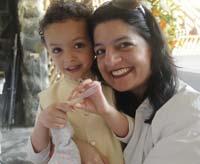Are you a match for Devan?

The challenge is complicated by Devan’s background – his father Dermot, 44, is European, while his mother, Indira Lakshmanan, 42, is of mixed Polish and south Indian heritage. This is their plea for help to Canadians.
By Indira Lakshmanan and Dermot Tatlow
Our only child, Devan, is just like any other four-year-old boy.
He loves to barrel down a snowy hill on a sled so rapidly that we adults avert our eyes. He loves to read Curious George.
He loves animals and wants to be a vet so he can help animals.
But there are two things that make Devan different. One is that he has cancer. The second thing is that he could end up saving you or your child’s life.
Devan needs a bone-marrow transplant. If he were a white child, finding a donor who is a medical match would not be a big problem.
We would search the world’s national bone marrow donor registries and we would probably be lucky – the average white patient has 15 matches to choose from. But Devan is part South Asian and part northern European.
In theory, anyone could be a match for Devan, but the chances are far better if the donor shares his genetic profile, and very few people in the registry do – only 3.8 percent of the quarter-million Canadians registered for donation are Asian, and 2.2 percent are South Asian, for example. So far, we have found no match.
Devan was first diagnosed with Acute Promyelocytic Leukemia in August, 2007, when he was just under two years old. He went through a year of chemotherapy and came out the other side – in remission.
But sadly, the remission ended this month. He is now undergoing more chemotherapy, but needs a bone marrow transplant to save his life.
It’s obvious how finding the right donor can save Devan. But how can he help your family and community?
If you are South Asian then you run a similar risk to Devan – if you need a bone marrow or stem cell transplant, there are very few Asians and South Asians in the world’s registries who are your best bet for a match.
There are no registries in India – so people there must look in registries abroad, for example in Canada.
If knowing about Devan inspires more Asians to register as possible donors, there is a better chance that any Asian will be able to have a lifesaving transplant.
We are looking especially for people who have both South Asian and Northern European ancestry, but all South Asians should register.
Registering is easy – it’s free, and most people between 17 and 50 are eligible.
You can call 1 888 2 DONATE.
Or go to Devan’s website: www.matchdevan.com – it has links to the registries in various countries.
In Canada, the name of the registry is the One Match Stem Cell and Marrow Network. It will send you some long q-tips in the post; you swab the inside of your cheek and send the package back.
As we write, Devan has just started his chemotherapy, and he’s still zooming around the house and feeling pretty good. We know it won’t last.
Every parent can imagine what we are feeling right now.
And every parent can imagine how it would feel to be told you are the one who can save our boy’s life.”
Indira Lakshmanan and Dermot Tatlow are journalists based in Washington. DC.
What is Acute Promyelocytic Leukemia?
APL is a high-risk form of leukemia, a cancer of the blood. It is usually found in adults or teenagers – Devan was just under two when he was diagnosed.
APL represents about 1 in 100 cases of childhood leukemia. All childhood leukemias are much more curable than they used to be, and APL is no exception. Before 1970, a diagnosis of APL was invariable fatal.
But today, about 75-80 percent of children with APL will go on to be long-term survivors.
If a patient with APL relapses, however, a bone marrow or stem-cell transplant from a donor is virtually the only chance of survival.






